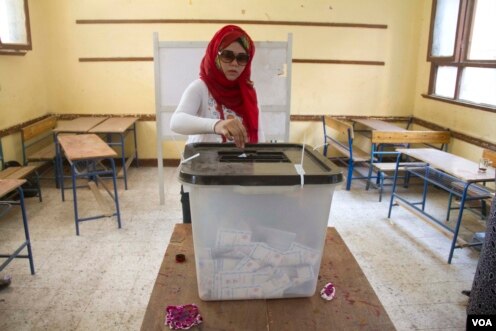
A woman votes in Cairo, May 27, 2014. (Hamada Elrasam /VOA)
Egypt's election commission has extended the presidential poll by one day in an effort to increase voter turnout in an election that is widely expected to bring former army chief Abdel-Fattah el-Sissi to power.
The two-day vote was expected to end Tuesday, but polling Monday was reported to be moderate in a country with 54 million registers voters.
The extension is widely seen as an effort to boost lower than expected turnout that threatened to undermine the credibility of the frontrunner, Sissi, who toppled the country's first freely-elected civilian president last July.
After Sissi called for record voter participation, low turnout would be seen at home and abroad as an immediate setback for Sissi, Reuters reported.
In an effort to increase numbers, Prime Minister Ibrahim Mahlab declared Tuesday a public holiday, while the justice ministry warned Egyptians who did not vote would be fined.
High voter turnout is being seen as the key to legitimizing Sissi's expected victory. His victory is a foregone conclusion.
Election monitoring groups said the turnout on the first day of the vote was moderate and often thin or non-existent in towns and areas where Islamists dominate.
However, el-Sissi and his supporters have been counting on a large turnout to send a message to the West - as well as his opponents, mainly from the Muslim Brotherhood, which is boycotting the election - that his removal of Islamist President Mohamed Morsi was not a coup but a popular revolution, similar to the 2011 uprising that ended autocrat Hosni Mubarak's almost 30-year-long rule.
Morsi was Egypt's first freely-elected president since the military coup that toppled King Farouk in 1952. Before Morsi, all of Egypt's presidents had come from the military ranks.
Local media loyal to the government chided voters for not turning out in large enough numbers, and Egyptians received text messages reminding them that not voting was an offense punishable by a fine. A prominent TV commentator said people who did not vote were "traitors, traitors, traitors."
After polls opened at 9 a.m. local time, lines outside polling stations in various parts of Cairo were short, and in some cases no voters could be seen. The polls close at 10 p.m. Tuesday, an hour later than planned.
Only one other candidate
There is only one other candidate: leftist politician candidate Hamdeen Sabahi, whose campaign described turnout on day one as "moderate, and below moderate in some cases."
Sabahi's campaign complained of many violations, including physical assaults on Sabahi representatives, and "intervention by police and army,'' on the first day of voting.
Official results are not due to come out until next week, but el-Sissi has long been considered the likely winner in the race.
In addition to the Muslim Brotherhood, many of the pro-democracy youths who participated in the 2011 uprising against Mubarak are also boycotting the polls.
El-Sissi enjoys the backing of many Egyptian Muslims attracted by his pious demeanor - he has presented himself as a defender of Islam - and Coptic Christians whose churches were attacked after Morsi's downfall and who see him as a protector.
“I am voting for el-Sissi because we need to get rid of the Muslim Brotherhood. He stood behind the people to overthrow this garbage [the Brothers]. He will improve security and the economy,” said Adnan al-Gindi, a 54-year-old dentist, as he waited to vote for el-Sissi in the affluent Cairo area of Zamalek.
The Brotherhood, which came first in both parliamentary and presidential polls held after Mubarak's downfall, has been driven underground in a campaign of repression that has killed hundreds of its followers and landed thousands more in prison.
It is the second time Egyptians are electing a president in two years. And it is the seventh vote or referendum since 2011.
As president, el-Sissi would have to meet the expectations of those who have backed him in the hope that he can tackle poverty, unemployment and other social problems. He would also be expected to address the corruption, cronyism and inequality between rich and poor that caused the 2011 revolution.
Election reaction
Local media presented the election as a success.
"Egyptians make history,'' declared Al-Ahram, the state's flagship newspaper, showing a snaking line of men waiting to vote, reported Reuters.
"Egyptians choose the president and declare the end of the Brotherhood,” announced Al-Masry Al-Youm, an independent newspaper hostile to the Islamist movement that was toppled after mass protests against Morsi's rule last year.
Some described voting as a waste of time, according to Reuters.
"The two candidates are imposed upon us. I don't want either," said 24-year-old Wael Shawky, as he pulled loaves of state-subsidized bread out of the oven of the bakery where he works in the working class district of Imbaba.
Others said Egypt needed a military man.
“He is the head of the army, he is respected, he is not corrupt or a thief so am voting for el-Sissi,” Douaa Mohammad 34, mother of two from Imbaba, said in a Reuters report. |
|
